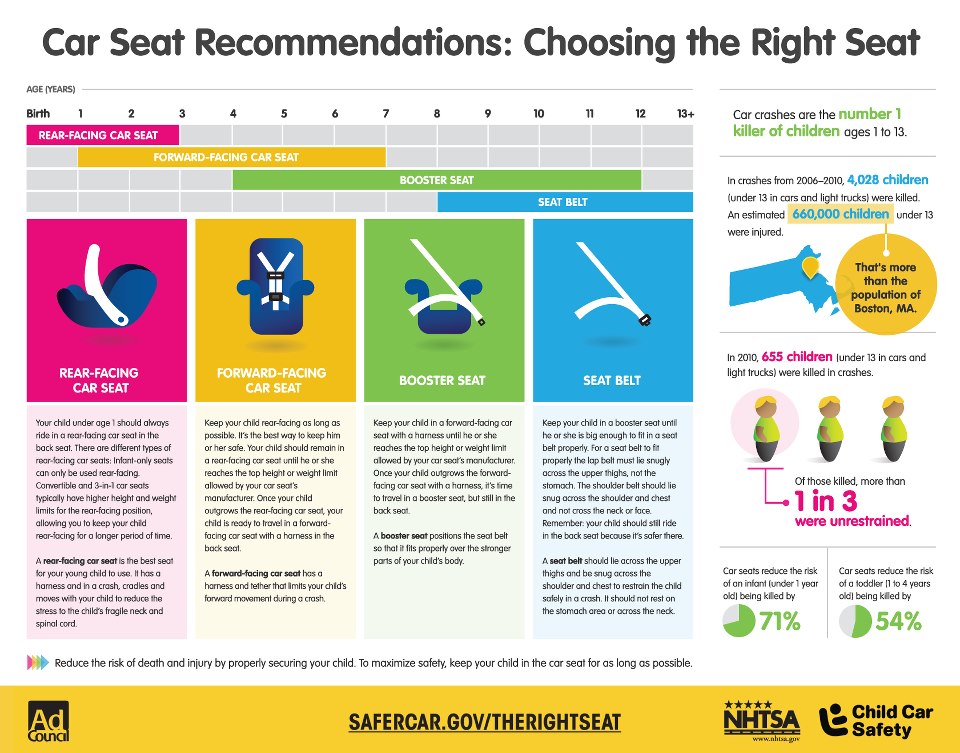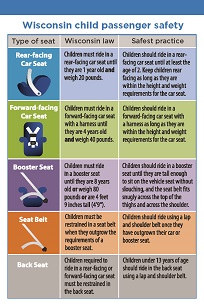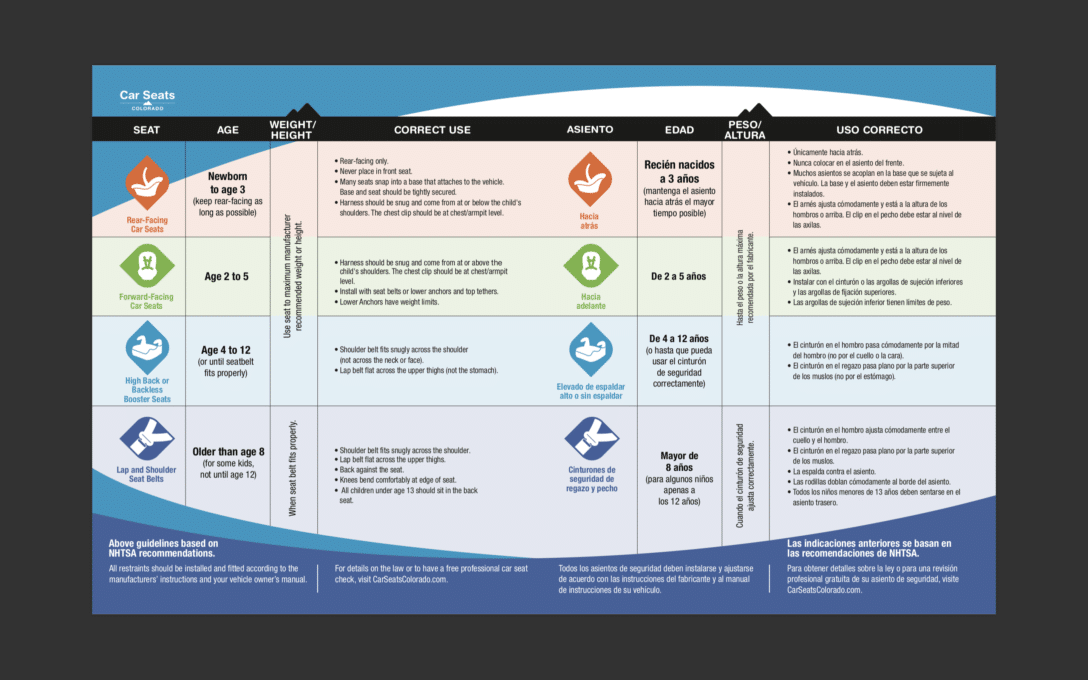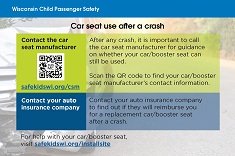The children seatbelt law in Wisconsin states that. If their kids are between ages four and eight the penalty fee costs 15010 for the first offense.

New Jersey Car Seat Laws 2022 Current Laws Safety Resources For Parents Safe Convertible Car Seats
All eight-year-olds who weigh more than 80lbs and are taller than four foot nine must be restrained in a booster seat.

. Keep children rear facing as long as they are within the height and weight requirements for the car seat. This rear-facing car seat law in Wisconsin follows the American Academy of Pediatrics recommendation that a rear-facing car seat be used for infants and toddlers under 2 years of age. Not only should parents consider recommendations from the AAP but also keep the manufacturer.
The regulations also make it clear that the forward-facing car seat should be installed in the back seat of the vehicle if there are back seats. Unfortunately road crashes takeaway many young lives daily and only in iowa nearly 4 out of 100000 children die in vehicle. The rear-facing car seat has to be installed in the back seat.
Children are not permitted to ride in a booster seat in Wisconsin until they are at least 4 years old and 40 pounds. Alaska laws require that. Children must ride in a rear-facing car seat until they are 1 year old and weigh 20 pounds.
According to the law all kids under the age of 1 and weighing less than 20 pounds have to be secured with a rear-facing car seat. Convertible car seats allow children to stay rear-facing longer. Vehicle child safety seat requirements including age and height limits for different types of car seats.
Must be secured in a rear-facing car seat. Wisconsin car seat laws require that children under the age of four or weighing less than 40 pounds ride in an approved car seat. Though the law states two years old the American Academy of Pediatrics AAP advises keeping children in rear-facing seats as long as they will fit.
Be sure to follow manufacturer minimum and maximum size requirements for your. All children who are four years old or younger and weigh up to 40lbs must be restrained in a car seat. Breaking the children seatbelt law is a much more serious violation than.
Wisconsin requires children to ride in a car seat or booster seat until they reach 49 or 8 years old or 80 pounds. You can be pulled over and ticketed for breaking this law. Car seat laws in Wisconsin are simple and easy to follow children under 1 and 20 pounds of weight shall use a rear-facing seat children over 3-4 shall sit in a front-facing seat and children over 80 pounds around 8-10 shall use a booster seat.
Ad From safety features to design details our baby essentials are made with parents in mind. Children less than 1 year of age and children who weigh less than 20 pounds are required to use a rear-facing child safety seat in the back seat if possible. Drivers are responsible forand can be ticketed for violations bypassengers younger than 16.
Seat belt laws in Wisconsin say that the driver and all passengers over the age of four must wear a seat belt. The laws in Wisconsin are quite clear at this point. Once children turn 4 they can then switch to an approved booster seat which they must continue to use until they turn 8 reach 49 tall or weigh at least 80 pounds.
Anyone who violates the law of not using a restraint system will be charged 175. The fee for a. Wisconsin car seat laws have both age and weight requirements.
All children need to be correctly secured into an adequate restraint system or a safety belt. Children who are at least 1 year old and 20 lbs or younger than 4 years old and 40 lbs must be in a forward. If a parent has a child less than four years of age and doesnt follow Wisconsins car seat laws they would have to pay a fine of 17530.
Toddlers age 1 through 3 years old and 20-40 pounds can ride in a forward facing seat. Wisconsin Car Seat and Booster Seat Laws Rear-Facing Car Seat. Children need to use a safety seat until the age of four and a booster seat from four to eight.
Children age from 1 to 4 years old and weigh more than 20 lbs. Older children must be in a booster seat until they reach the age of 8 weigh more than 80 pounds and reach the height of 4 foot 9 inches. Once a child reaches age 4 and is at least 40 pounds he or she may ride in booster seat.
Be installed in a rear-facing car seat installed in the back seat. Kids should use age-appropriate child restraint systems. Keep children in a rear-facing car seat until at least the age of 2 or longer and as long as they are within the height and weight requirements for the car seat.
According to Wisconsin law section 34748 4 part as rules 1 and 2 children who are at least one year old and 20 pounds but under 4 years old and weighing less than 40 pounds must be in a rear- or forward-facing child seat. Martindale-Nolo and up to 5 participating attorneys may contact you on the number you. However experts recommend keeping kids in rear-facing mode until the age of 2 because rear-facing is the safest ride.
Failing to abide by Wisconsins car seat. These rules might sound a little confusing and I dont blame you for feeling that way but to. According to Wisconsin car seat laws any child under the age of two should be in a rear-facing seat.
Wisconsin Rear-facing Car Seat Laws. Infants less than a year old and less than 20 pounds must ride in a rear facing infant seat. Wisconsin Booster Seat Law.
Wisconsin child passenger safety Type of seat Wisconsin law Safest practice Children must ride in a rear-facing car seat until they are 1 year old and weigh 20 pounds. By this law infants less than 1 year or weighing under 20 lbs. Keep them in the forward-facing car seat until they reach the weight or height limits on.
Keep them in the safer rear-facing position as long as possible because kids who ride rear-facing have the best protection for their head neck and spine. Wisconsin law requires all passengers to restrain themselves with a safety belt. Copyright 2022 Car Seat Safety and Laws Car Seat Safety and Laws.
The top rated rear facing car seats of 2017. Shop durable award-winning car seats strollers highchairs more. Should be kept in a 5-point harness forward-facing car seat until they reach the top height or weight limit.
By clicking Submit you agree to the Martindale-Nolo Texting Terms. Infants less than 1 year or toddlers older than one year but less than 20 lbs. Children who have outgrown their rear-facing car seat move to a forward-facing seat with a harness.
Given that car accidents are a leading cause of injury among children younger than 13 years of age it is important that you. Please answer a few questions to help us match you with attorneys in your area. Children should ride in a rear-facing car seat until at least the age of 2.
Seat Belt Laws.

Child Safety Seats Harris County Texas Sheriff S Office

Wisconsin Car Seat Laws Child Safety Requirements

Kewaunee County Departments Public Health Family Health Maternal Child Health Services

Child Passenger Safety Resources Materials

Child Safety Seats City Of Racine

Nevada Car Seat Laws 2022 Current Laws Safety Resources For Parents Safe Convertible Car Seats

Colorado Car Seat Laws 2022 Current Laws Safety Resources For Parents Safe Convertible Car Seats

0 comments
Post a Comment